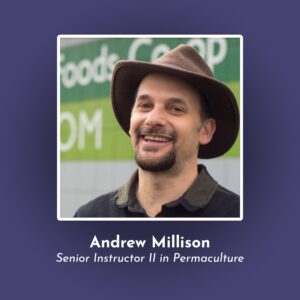
Show Summary
On this episode, permaculture expert and educator Andrew Millison joins us to unpack how we can better design our societal infrastructure and agriculture to be more attuned with the water, solar, and “geomorphic” conditions of our surroundings. When critical resources become scarce, it is more important than ever that communities learn to do more with less. By focusing on resiliency and stability through systems thinking, permaculture is a design system which does just that. In a world that often feels beyond our control, how can we use permaculture design to work with the land rather than against it, and regain agency in our local food, water, and social systems?
About Andrew Millison
Andrew Millison is an innovative educator, storyteller and designer. He founded the Permaculture Design education program at Oregon State University (OSU) in 2009. At OSU Andrew serves as an Education Director and Senior Instructor who offers over 25 years of experience, and a playful approach to regenerative design. Andrew is also a documentary videographer who travels the world documenting epic permaculture projects in places such as India, Egypt, Mexico, Cuba, and throughout the US. You can view his videos and series on his YouTube channel.
In French, we have a motto that says that a simple drawing is often better than a long explanation. Jean-Marc Jancovici Carbone 4 President
That’s very understandable because with left atmosphere thinking, one of the problems is that you see everything as a series of problems that must have solutions. Iain McGilchrist Neuroscientist and Philosopher
We can’t have hundreds and hundreds of real relationships that are healthy because that requires time and effort and full attention and awareness of being in real relationship and conversation with the other human. Nate Hagens Director of ISEOF
This is the crux of the whole problem. Individual parts of nature are more valuable than the biocomplexity of nature. Thomas Crowther Founder Restor
Show Notes & Links to Learn More
Download transcript00:53 – Andrew Millison works + info + youtube channel
03:36 – Vandana Shiva + TGS Episode
04:41– India on track to become most populous country in 2023
05:30 – What is Permaculture?
06:40 – Bill Mollison
06:52 – David Holmgren
08:24 – Destructiveness of conventional agriculture
09:15 – Regenerative Agriculture
11:35 – Silicon Valley Bank
13:09 – Overton Window
14:07 – Barbara Rose and Brad Lancaster
14:10 – Tim Murphy
15:10 – Liebig’s Law
15:42 – Desalination grid linking the Gulf States
15:59 – Energy intensity of desalination grid
16:15 – The roots of many conflicts between nations is in water
16:35 – Climate change effects on rainfall levels
17:13 – Permaculture Designer’s Manual
18:54 – The Tropical Permaculture Guide
21:04 – Permaculture Global – Permaculture Research Institute
22:01 – Permaculture one of the largest collective aid and relief initiative
22:50 – India’s Water Revolution Series on Andrew’s Channel
24:45 – How Watersheds divide the landscape
25:33 – Maharashtra
25:54 – Pemgiri
26:10 – Banyan Tree
27:02 – Land management based on watershed
27:55 – US grid based system for dividing land
28:34 – Watershed democracy
28:59 – America’s Big Mistake
29:09 – John Kitzhaber
29:29 – John Wesley Powell
30:11 – Geomorphology
31:50 – Humans have divided landscape by watershed for millenia
31:58 – Did Native Americans divide land by watershed?
33:13 – Hopi Land, Rio Grande River Valley
33:25 – Tradition of Nomadism in some Native American Cultures
38:10 – Coimbatore
38:41 – Coimbatore ancient Water System
39:07 – KKPA
39:24 – Tamil Nadu
42:30 – The U.S.’s lack of cooperation and community wide effort
43:40 – Mahatma Gandhi, Salt March
44:20 – Cultural Memory
44:58 – Jason Bradford + TGS Episode
47:43 – Well done regenerative agriculture can out-produce conventional agriculture
47:50 – Paani Foundation
47:51 – Aamir Khan
49:35 – Bio-organic Agriculture best practices
51:33 – Cooperatives
51:42 – Isha Foundation
52:08 – Karnataka
52:15 – Reduction in labor hours with organic, regenerative agriculture
53:45 – Biofertilizers
54:01 – Nitrate pollution from factory farming
54:33 – Small scale animal husbandry
55:31 – Trees as boundary markers
55:45 – Benefits of trees to the landscape and to agriculture
57:37 – Peter Zeihan – The End of the World is Just the Beginning
59:17 – Oregon State Agriculture
1:00:05 – The Organics Growers Club – James Cassidy
1:07:59 – NextDoor
1:22:28 – Oregon State Permaculture







